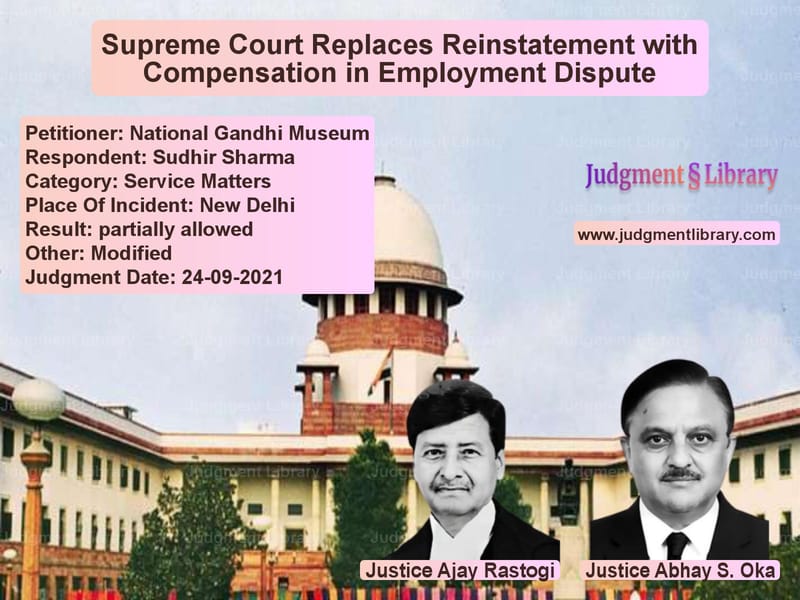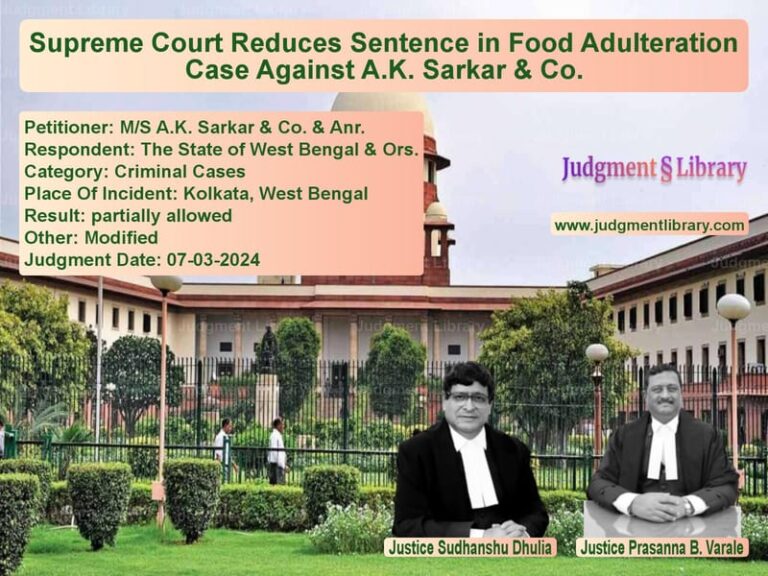Supreme Court Replaces Reinstatement with Compensation in Employment Dispute
The Supreme Court of India, in the case of National Gandhi Museum vs. Sudhir Sharma, addressed an employment dispute where an employee was compulsorily retired following allegations of misconduct. The Court ruled that reinstatement was not a just remedy in this case and instead directed the employer to pay compensation. This judgment highlights important principles regarding employment disputes, industrial law, and appropriate remedies in cases of wrongful termination.
Background of the Case
The dispute arose between National Gandhi Museum (appellant) and Sudhir Sharma (respondent). The respondent was appointed as a Museum Assistant at the National Gandhi Museum on December 24, 1996. The employment relationship soured when the respondent objected to an office order regarding compensatory leave and allegedly assaulted the Assistant Director of the museum on December 27, 2003.
Following the incident, the appellant issued a charge sheet against the respondent and conducted an inquiry, which found him guilty of misconduct. Consequently, the respondent was compulsorily retired on September 16, 2004. The respondent challenged this order, leading to legal proceedings that lasted nearly two decades.
Legal Proceedings
1. Industrial Tribunal Proceedings
The respondent raised a dispute regarding compensatory leave before the Industrial Tribunal, Delhi. Meanwhile, the appellant sought approval under Section 33(2)(b) of the Industrial Disputes Act, 1947, for the compulsory retirement of the respondent. However, the appellant later withdrew this application, claiming that approval was not necessary for compulsory retirement.
2. Delhi High Court’s Intervention
The respondent filed a writ petition in the Delhi High Court, challenging his compulsory retirement and arguing that it was void due to the failure of the appellant to obtain approval under the Industrial Disputes Act. The High Court ruled in favor of the respondent, directing his reinstatement with back wages. The appellant challenged this decision.
3. Appeal Before the Supreme Court
Aggrieved by the High Court’s order, the National Gandhi Museum approached the Supreme Court, arguing:
- That it was not an “industry” under the Industrial Disputes Act and thus not subject to its provisions.
- That the respondent’s misconduct justified his compulsory retirement.
- That reinstating an employee who had been out of service for 17 years would not serve justice.
Supreme Court’s Key Observations
1. Industrial Status of the National Gandhi Museum
The Court refused to entertain the appellant’s argument that it was not an industry under the Industrial Disputes Act. The appellant had consistently treated itself as an industry, including by filing an application under Section 33(2)(b) of the Act. The Court ruled:
“Since the appellant has, at all material times, proceeded on the footing that it is an industry under the Industrial Disputes Act, it cannot now be permitted to argue otherwise.”
2. Failure to Obtain Approval under Section 33(2)(b)
The Supreme Court observed that since the appellant withdrew its approval application under the Industrial Disputes Act, the termination of the respondent was legally void:
“Failure to obtain approval under Section 33(2)(b) renders the order of compulsory retirement void, entitling the employee to relief.”
3. Justification for Not Reinstating the Respondent
The Court considered whether reinstating the respondent was the appropriate remedy. Given the long gap since his retirement and the nature of the allegations, the Court found reinstatement inappropriate:
“Considering the aims and objectives of the National Gandhi Museum and the proven misconduct of the respondent, reinstatement would not be in the interest of justice.”
4. Awarding Compensation Instead of Reinstatement
Relying on precedents, including Indian Railway Construction Co. Ltd. vs. Ajay Kumar and Talwara Cooperative Credit & Service Society Ltd. vs. Sushil Kumar, the Supreme Court held that monetary compensation was a more appropriate relief.
The Court directed the appellant to pay the respondent a total of Rs. 6,50,000 in compensation, inclusive of the Rs. 4,43,380 already received. The appellant was ordered to pay the balance of Rs. 2,50,000 within six weeks, failing which the amount would attract 12% annual interest.
Final Judgment
The Supreme Court ruled:
- The order of reinstatement was set aside.
- The back wages were replaced with monetary compensation.
- The appellant must pay the remaining Rs. 2,50,000 within six weeks.
Implications of the Judgment
1. Clarification on Industrial Disputes Act Applicability
This judgment reiterates that entities treated as industries under the Act cannot later deny their status to avoid obligations.
2. Balancing Employer and Employee Rights
By opting for compensation instead of reinstatement, the Court balanced the interests of both the employer and employee.
3. Preventing Long-Pending Employment Disputes
The decision discourages prolonged litigation by setting clear guidelines for resolving employment disputes in a timely manner.
4. Reinforcement of Alternative Relief Mechanism
The judgment strengthens the approach of granting compensation as an alternative to reinstatement in cases of long-standing disputes.
Conclusion
The Supreme Court’s decision in National Gandhi Museum vs. Sudhir Sharma is a landmark ruling in employment law. It clarifies that while wrongful termination cannot be upheld, reinstatement is not always the best remedy, particularly in cases of serious misconduct and long delays. By awarding reasonable compensation, the Court ensured justice while maintaining fairness to both parties.
Petitioner Name: National Gandhi Museum.Respondent Name: Sudhir Sharma.Judgment By: Justice Ajay Rastogi, Justice Abhay S. Oka.Place Of Incident: New Delhi.Judgment Date: 24-09-2021.
Don’t miss out on the full details! Download the complete judgment in PDF format below and gain valuable insights instantly!
Download Judgment: national-gandhi-muse-vs-sudhir-sharma-supreme-court-of-india-judgment-dated-24-09-2021.pdf
Directly Download Judgment: Directly download this Judgment
See all petitions in Employment Disputes
See all petitions in Public Sector Employees
See all petitions in Termination Cases
See all petitions in Disciplinary Proceedings
See all petitions in Judgment by Ajay Rastogi
See all petitions in Judgment by Abhay S. Oka
See all petitions in partially allowed
See all petitions in Modified
See all petitions in supreme court of India judgments September 2021
See all petitions in 2021 judgments
See all posts in Service Matters Category
See all allowed petitions in Service Matters Category
See all Dismissed petitions in Service Matters Category
See all partially allowed petitions in Service Matters Category







